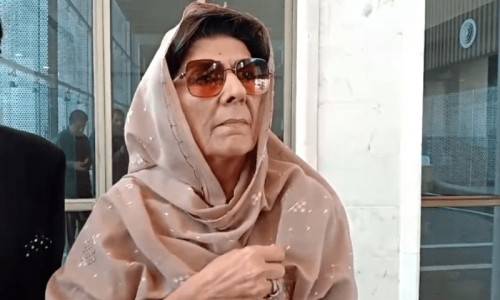ISLAMABAD: In what can be called a frantic move, former prime minister Nawaz Sharif approached the Supreme Court again on Monday to seek immediate bail on medical grounds.
The last time a similar request was made before the SC was on March 1 with a plea for the early hearing of his appeal against the Feb 25 Islamabad High Court order of turning down his bail plea on medical grounds in the Al-Azizia corruption reference.
“That since the rejection of the aforesaid (earlier) application, the medical condition of the petitioner (Nawaz Sharif) has worsened and, as such, the instant application is being filed with a prayer that in view of the urgency involved in this case the CPLA [civil petition for leave to appeal] may be ordered to be fixed in the next week,” says a fresh single-page application moved through Mr Sharif’s counsel, Khawaja Haris Ahmed. The application calls for fixing the hearing by the SC at an early date in the coming week.
The earlier request for an immediate hearing was turned down by the registrar’s office with the observation that the matter would be settled in its own turn.
Plea quotes report of special medical board in identifying former premier’s illnesses
The high court, in its Feb 25 order, had held that none of the medical reports about Mr Sharif’s condition suggested that his continued incarceration would in any way jeopardise his life, adding that he had been hospitalised time and again since Jan 2019, whenever he complained about indisposition. “In fact the reports of the board of doctors are indicative of the fact that [the] petitioner is receiving best possible medical treatment available to any individual in Pakistan,” the judgement held.
But the appeal filed in the Supreme Court on behalf of the former premier contended that Mr Sharif should be released on bail after the suspension of the execution of the Dec 24, 2018, sentence of seven years’ imprisonment awarded by Accountability Court No II, adding that the Feb 25 IHC order was in violation of his fundamental right to life as guaranteed by Article 9 of the Constitution. Continuing, it said that the Pakistan Prison Rules 1978 were neither relevant to nor were invoked by him for the suspension of his sentence on medical grounds. As such, it maintained, reference to the police rules or their non-applicability to his case was redundant and extraneous to his plea for the suspension of sentence.
The appeal also highlighted that the diagnosis recorded in the medical reports of the special medical boards suggested that Mr Sharif was suffering recurrent angina, ischemic heart disease, coronary artery disease, diabetes, hypertension, chronic kidney disease in stage three, diabetic nephropathy, and other illnesses.
The medical board had also unanimously recommended that the former premier required round the clock monitoring in a multidisciplinary facility for managing his ailments and that he required angiography after clearance from nephrologists and cardiac surgical back-up.
But, the petition said, the high court failed to exercise the jurisdiction vested in it by law in passing the Feb 25 judgement without adverting to the particular facts pertaining to the medical condition of Mr Sharif, despite noting the principle, as laid down in the 1997 Muhammad Arshad case, that in cases involving the suspension of a sentence on medical grounds, the facts of each case have to be assessed on its own merits.
The petition expressed the fear that the medical reports pertain only to diagnosis, showing that Mr Sharif was suffering from different ailments that collectively constitute a risk for a stroke, an alarming degree of threat of irreversible damage to his heart, and potential threat to further deterioration of other diseases.
Published in Dawn, March 12th, 2019













































